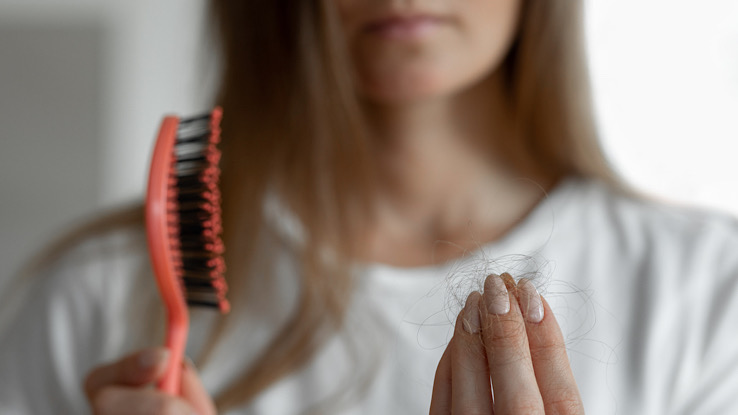
Chemotherapy (chemo) can be very effective at curing or controlling cancer. However, it tends to come with various side effects, including hair loss. This article explains why hair loss occurs when you undergo chemotherapy and provides tips for managing and dealing with your hair loss.
Why It Happens
Hair loss (also known as alopecia) is a relatively common side effect of chemotherapy. Though chemotherapy drugs are intended to kill or slow the growth of cancer cells, they sometimes affect healthy cells as well. One of the cells that chemo is most likely to attack is the cells that cause your hair to grow because the drugs attack any rapidly dividing cells, including your hair follicles.
What To Expect
Many people don’t realize that chemo can cause you to lose hair all over your body – not just on your head. If you’re going through chemotherapy, you may lose hair on your head, armpits, or legs. The drugs may also cause you to lose your eyebrows, eyelashes, pubic hair, or any other hair on your body.
In addition, you may not lose all of your hair. Some people who undergo chemotherapy only lose patches of hair or experience a thinning of their hair instead of complete baldness.
The following is a timeline of when your hair loss is likely to occur if you undergo chemotherapy:
- 2 to 3 weeks into treatment: Hair loss usually begins after a couple of weeks of chemo. Your scalp may feel tender around this time.
- 3 to 4 weeks into treatment: It takes about one week after the hair starts to fall out for all the hair to fall out. The hair may fall out quickly in clumps or gradually over days.
- 2 to 3 months after chemo is over: Most people’s hair starts to grow back within a few months of their last chemotherapy treatment. However, their hair is sometimes a different shade or texture than before, and this difference is usually temporary.
Prevention Techniques
There are only a few potential hair loss prevention techniques that you can consider before undergoing chemotherapy. Make sure to talk to your doctor before trying any of these methods:
Certain chemotherapy drugs are more likely to cause hair loss than others. Ask your doctor about trying different drug combinations that won’t affect your hair if possible.
You can place ice packs or other cold devices on the head during chemotherapy, known as scalp hypothermia or cryotherapy. The purpose is to slow blood flow to the scalp, which will help the drugs be less effective in this area. Studies have found this technique to work partially in most people who try it, but there are risks. Cryotherapy may cause uncomfortable coldness and headaches and may even increase the risk of cancer recurring in your scalp.
Management Techniques
Dealing with hair loss can be difficult. Here are some tips for dealing with it on both a practical and emotional level:
- Protect your scalp: Since hair loss can cause your scalp to feel tender, you should be very gentle when brushing or washing your hair. You may want to do these things sparingly to prevent discomfort and additional hair loss. It would help if you covered your head when going out into the cold air or direct sunlight.
- Get a satin pillow: A satin pillowcase creates less friction between your hair and the pillow as you sleep. You may find it much more comfortable sleeping on this type of pillow during and after your hair loss.
- Wigs, scarves, or hats: Many people use wigs, scarves, or hats to cover their thinning hair or bald head. These are excellent ways to deal with your changed appearance when you don’t want to attract extra attention or explain why you have no hair. Insurance companies will sometimes cover the cost of purchasing a wig.
- Get support: Many cancer support groups can help you emotionally with your health condition and hair loss. The “Look Good…Feel Better” program offers free services to help cancer patients who want help with hair and beauty tips during this difficult time.
Hair loss can be a problematic side effect of chemotherapy, but fortunately, it is temporary. If you have concerns about how chemotherapy will affect your hair, talk to your doctor about possible prevention techniques. In addition, your doctor may direct you to local resources, which can help you obtain a wig or get emotional support during your treatments.
Resource Links:
- “Chemotherapy-induced alopecia management: clinical experience and practical advice” via Journal of Cosmetic Dermatology
- “https://www.ncbi.nlm.nih.gov/pmc/articles/PMC7319796/“ “Prevention and Treatment of Chemotherapy-Induced Alopecia” via Dematology Practical & Conceptual
- “Hair loss in chemotherapy: Can chemotherapy-related hair loss be prevented?” via Informed Health
- “Chemotherapy-induced hair loss” via Skin Therapy Letter
- “Pathogenesis and treatment options for chemotherapy-induced alopecia: a systematic review” via International Journal of Dermatology





